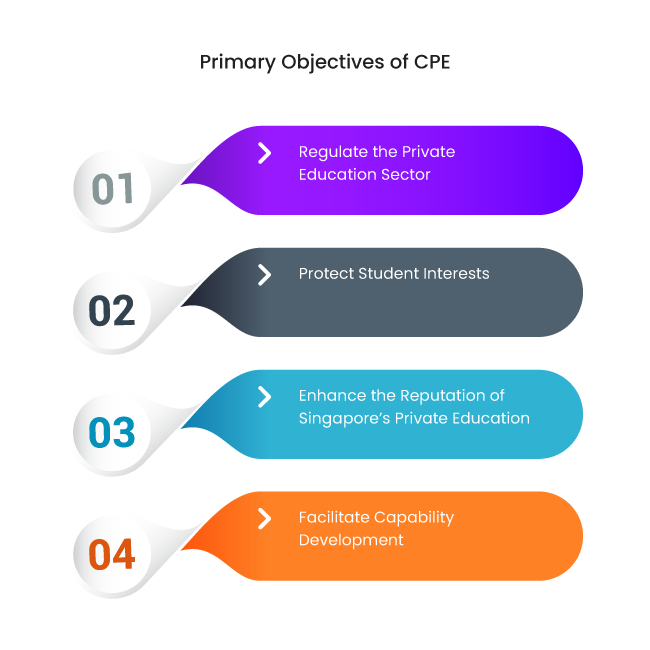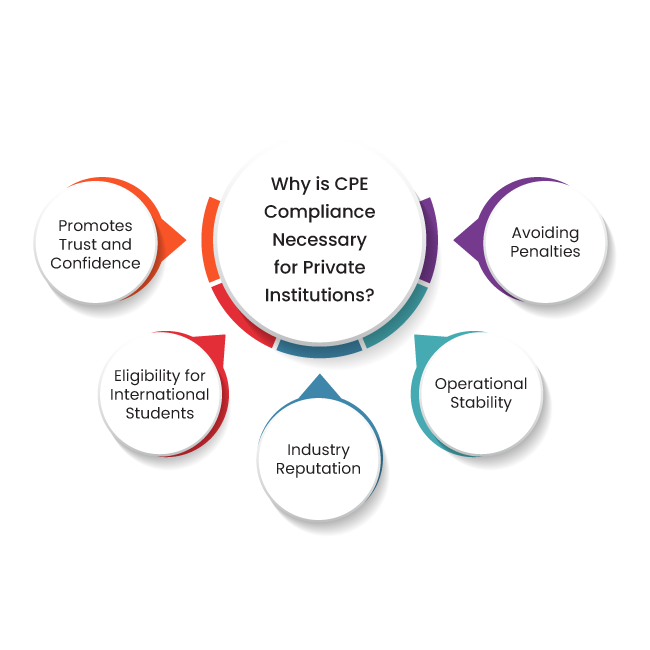Singapore has established itself as one of the leading educational hubs worldwide through a multifaceted approach, focusing on quality education and internationalisation, among other initiatives. The government’s commitment to maintaining and regulating the education system is instrumental in adapting to the global challenges.
Robust and well-developed regulatory frameworks, particularly for private educational institutions, have significantly contributed to the country’s academic success. The Committee for Private Education (CPE) is one such notable framework that ensures the quality of private education in Singapore.
Understanding CPE
CPE, or the Committee for Private Education, is an agency that was established in December 2009 under the Private Education Act to regulate private educational institutions (PEIs). The agency was a statutory body under the Ministry of Education, but the government integrated it into SkillsFuture Singapore in October 2016.
CPE carries out mandatory registration frameworks and various quality assurance mechanisms, helping to improve the overall standards of private education in the country. Furthermore, it establishes robust standards, encouraging private educational institutions to meet quality benchmarks across core operations.

Primary Objectives of CPE
Regulate the Private Education Sector
The CPE sets forth and enforces a comprehensive set of guidelines and rules that all private education institutions must follow. These rules encompass various components of institutional operations, including student welfare, financial stability, faculty qualifications, and curriculum standards.
Protect Student Interests
One of the most significant responsibilities of the agency is to protect both local and international students from exploitation or poor educational experiences. Hence, it includes implementing measures that ensure fair and transparent practices related to contracts, fees, and dispute resolution.
Enhance the Reputation of Singapore’s Private Education
The CPE aims to elevate the overall standing and credibility of Singapore’s private education nationally and internationally by implementing stringent standards. A well-developed and systematic approach helps to distinguish legitimate and quality institutions from those that might undermine the education sector’s reputation.
In effect, it helps to attract more students and enhance Singapore’s reputation as an ideal education destination.
Facilitate Capability Development
Apart from ensuring regulation, the CPE fosters the capabilities and professionalism of the private education sector in Singapore. Therefore, it conducts workshops, initiatives, resources, etc., that help private educational institutions to enhance their teaching methodologies, overall education delivery and administrative processes, helping to create a more skilled private education landscape.
Critical Compliance Frameworks for Private Educational Institutions
The CPE has established crucial compliance frameworks that private educational institutions must adhere to, which are as follows:
1. Enhanced Registration Framework
Enhanced Registration Framework, or ERF, is a mandatory registration framework that all private educational institutions in Singapore must comply with to legally start operations. The ERF includes the basic standards related to:
Curriculum Design and Delivery
PEIs must indicate that their courses have undergone considerable research, planning, logical structuring, and systematic delivery to students. In effect, it should include clearly defined outcomes, appropriate content, consistent assessment strategies and effective teaching methodologies. Also, the curriculum must be relevant and aligned with academic standards and industry requirements.
Academic Staff Qualifications
The academic staff or faculty must possess the necessary qualifications as required for the particular subjects that they teach. The faculty must demonstrate pedagogical expertise and have practical industry experience wherever applicable, apart from possessing the necessary academic degrees. This ensures that students get quality education from expert and knowledgeable educators.
Facilities and Resources
The ERF mandates PEIS to provide suitable infrastructure, including well-maintained classrooms, well-equipped laboratories, access to comprehensive library resources and ed-tech solutions, such as student information systems, etc.
Management and Government Systems
Institutions must establish clear and effective governance structures, including sound financial management practices, defined roles and responsibilities for key personnel, and transparent policies for student admissions, welfare, and progression.
Marketing and Advertising
The ERF has laid out guidelines for the marketing and advertising campaigns (online and offline) for PEIs. This ensures that the advertising practices are not deceptive and involve truthful and factual information.
IHL Recognition in Singapore: A Guide to Higher Ed Accreditation
2. EduTrust Certification Scheme
The Edutrust Certification Scheme is a voluntary quality assurance scheme that helps to distinguish PEIs, depending on how they perform across critical management areas and the provision of educational services. This scheme covers seven key criteria, which are as follows:
- Corporate Administration
- Leadership and Strategic Planning
- Student Protection and Support Services
- Quality Assurance, Innovation, and Continual Improvement
- External Recruitment Agents
- Academic Systems and Processes
- Performance Outcomes
Although this scheme is voluntary, it is highly recommended for PEIs, as it provides notable benefits, particularly for attracting international students. Besides, only EduTrust-certified institutions can offer admissions to international students who require student passes from the Immigration and Checkpoints Authority (ICA). Furthermore, institutions with EduTrust certification reflect their commitment to providing high-quality education and maintaining positive student outcomes.
3. Fee Protection Scheme (FPS)
A mandatory regulatory requirement for EduTrust-certified PEIs is the Fee Protection Scheme (FPS), which helps to safeguard students’ fees. The Enhanced Registration Framework mandates PEIs to purchase insurance coverage for the enrolled students’ unconsumed course fees.
On the other hand, the scheme serves to protect the student in case a PEI discontinues operations as a result of insolvency or regulatory closure. The insurance company reimburses students for the unconsumed portion of the fees.
The scheme also protects the students if the institute fails to pay financial penalties or return the fees due to the judgment made against it by the Supreme Court.
4. Standard PEI-Student Contract
The Committee for Private Education has established a crucial compliance framework to ensure clarity and transparency in educational courses. Therefore, it has mandated all private educational institutions to use a standard PEI-student contract for courses with a duration of 50 hours or more or 30 days or more.
The contract is a legal document that sets a legally binding contractual commitment between students (or their parents/legal guardians if the student is under 18) and the PEIs. Also, the document clarifies matters related to:
- Course duration and title
- Course start and end dates
- Qualification awarded
- Course schedule and modules
- Scheduled holidays
- A detailed breakdown of course fees and installment schedules
- Miscellaneous fees and refund policies
Students and their parents must read the contract carefully to understand the terms and conditions before signing. A cooling-off period of seven working days allows students to cancel the contract and get a refund (according to specific terms) in case they want to withdraw their enrollment.

Why is CPE Compliance Necessary for Private Institutions?
CPE compliance is a legal mandate in Singapore, apart from which it improves the private education institution’s reputation and long-term success. Some of the important reasons why compliance matters are as follows:
Promotes Trust and Confidence
When a PEI complies with CPE standards, it reflects its long-term commitment to quality assurance and student development. This promotes trust and confidence between parents, students, and the particular institute.
Eligibility for International Students
Private educational institutions that aim to attract students from across the world must not only have EduTrust certification but also comply with the Fee Protection Scheme.
Industry Reputation
When institutions meet the set standards for student welfare, transparency and quality, it helps to establish trust between students, parents and the education sector. Consequently, the positive reputation leads to increased enrolment and enhanced reputation within the country and abroad.
Operational Stability
The agency has placed strict standards on academic processes, governance structures, and financial management. Timely and systematic compliance leads to long-term operational stability of private educational institutions.
Avoiding Penalties
The most immediate reason for CPE compliance is to avoid the serious consequences of non-compliance, including suspension of registration. For instance, PEIs might also have to pay hefty fines, mandatory rectifications, and direct revocation of the institution’s license to operate.
Conclusion
The Committee for Private Education, or CPE, plays an integral role in upholding the quality of private education in Singapore. Some of the key compliance requirements include the Enhanced Registration Framework, the EduTrust Certification Scheme, the Fee Protection Scheme, and the Standard PEI-Student Contract. Adhering to these compliance elements allows institutions to attain their legal obligations and indicate their commitment to providing high-quality education.
Click for a digitally empowered campus
 Author :
Author :
Poonam Nathani,
Academic Consultant